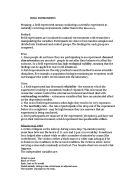1. A field experiment has decreased reliability - the extent to which the experiment would give consistent results if repeated. This is because the researcher cannot control the external environment and must deal with confounding variables – extraneous variables that have an unintended effect on the dependent variable.
2. The cost of field experiments is often high; they tend to be very expensive.
3. The mortality rate – the rate of participants who drop out of the experiment before it is completed – may be high because they are unaware that an experiment is being conducted.
4. Since participants are unaware of the experiment (deception), and have not given their informed consent, a field experiment has questionable ethics.
Piliavin et al, 1969
A victim collapses on the subway during a non-stop 7½-minute journey, some time between the hours of 11 a.m. and 3 p.m. on a weekday. Sometimes he is helped after a short while or after a number of minutes by a man (the confederate). The victim is either a black man or a white man acting as if he is drunk in one condition. In the second condition, the victim is sober, but is carrying a cane and is unsteady on his feet. Two female observers record what happens.
The independent variables are:
Drunk or cane
Black or White
Early, Late or No model
Model initially sitting in the critical area or adjacent area.
The number of people on the train.
The Dependent variables are:
The time taken to help.
The race of the helper.
The percentage of trials in which passengers (subjects) left the critical area.
The number of comments made.
Bibliography:
"Field Experiments - 'Real' World Studies.." Steps of the Scientific Method. N.p., n.d. Web. 23 Aug. 2012. <http://www.experiment-resources.com/field-experiments.html>.
"How Science Works."SmartPsych.co.uk — Edexcel AS and A2 Psychology. N.p., n.d. Web. 23 Aug. 2012. <http://www.smartpsych.co.uk
others, changing one variable (the independent variable) while measuring another (the dependent variable) while we control all, and as far as possible. "AS Psychology - Holah.co.uk - Experimental." AS Psychology - Holah.co.uk - Welcome to holah.co.uk. N.p., n.d. Web. 23 Aug. 2012. <http://www.holah.co.uk/page-detail.php?slug=experimental>.
"RDE Bonus Appendix | The Field Experiment." Website for jolley-mitchell.com . N.p., n.d. Web. 23 Aug. 2012. <http://www.jolley-mitchell.com/Appendix/App_Field_Experiment/Appendix_Field_Experiment.html>.








